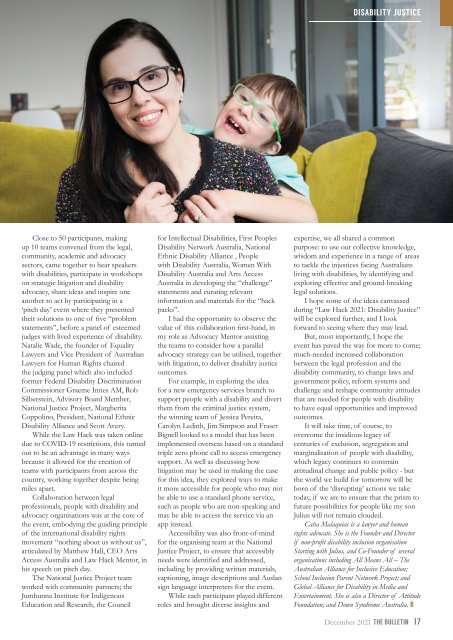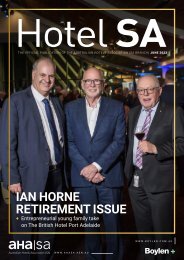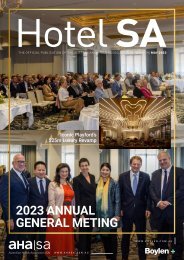LSB December 2021 HR
Create successful ePaper yourself
Turn your PDF publications into a flip-book with our unique Google optimized e-Paper software.
DISABILITY JUSTICE<br />
Close to 50 participants, making<br />
up 10 teams convened from the legal,<br />
community, academic and advocacy<br />
sectors, came together to hear speakers<br />
with disabilities, participate in workshops<br />
on strategic litigation and disability<br />
advocacy, share ideas and inspire one<br />
another to act by participating in a<br />
‘pitch day’ event where they presented<br />
their solutions to one of five “problem<br />
statements”, before a panel of esteemed<br />
judges with lived experience of disability.<br />
Natalie Wade, the founder of Equality<br />
Lawyers and Vice President of Australian<br />
Lawyers for Human Rights chaired<br />
the judging panel which also included<br />
former Federal Disability Discrimination<br />
Commissioner Graeme Innes AM, Rob<br />
Silberstein, Advisory Board Member,<br />
National Justice Project, Margherita<br />
Coppolino, President, National Ethnic<br />
Disability Alliance and Scott Avery.<br />
While the Law Hack was taken online<br />
due to COVID-19 restrictions, this turned<br />
out to be an advantage in many ways<br />
because it allowed for the creation of<br />
teams with participants from across the<br />
country, working together despite being<br />
miles apart.<br />
Collaboration between legal<br />
professionals, people with disability and<br />
advocacy organisations was at the core of<br />
the event, embodying the guiding principle<br />
of the international disability rights<br />
movement “nothing about us without us”,<br />
articulated by Matthew Hall, CEO Arts<br />
Access Australia and Law Hack Mentor, in<br />
his speech on pitch day.<br />
The National Justice Project team<br />
worked with community partners; the<br />
Jumbunna Institute for Indigenous<br />
Education and Research, the Council<br />
for Intellectual Disabilities, First Peoples<br />
Disability Network Australia, National<br />
Ethnic Disability Alliance , People<br />
with Disability Australia, Women With<br />
Disability Australia and Arts Access<br />
Australia in developing the “challenge”<br />
statements and curating relevant<br />
information and materials for the “hack<br />
packs”.<br />
I had the opportunity to observe the<br />
value of this collaboration first-hand, in<br />
my role as Advocacy Mentor assisting<br />
the teams to consider how a parallel<br />
advocacy strategy can be utilised, together<br />
with litigation, to deliver disability justice<br />
outcomes.<br />
For example, in exploring the idea<br />
for a new emergency services branch to<br />
support people with a disability and divert<br />
them from the criminal justice system,<br />
the winning team of Jessica Pereira,<br />
Carolyn Ledinh, Jim Simpson and Fraser<br />
Bignell looked to a model that has been<br />
implemented overseas based on a standard<br />
triple zero phone call to access emergency<br />
support. As well as discussing how<br />
litigation may be used in making the case<br />
for this idea, they explored ways to make<br />
it more accessible for people who may not<br />
be able to use a standard phone service,<br />
such as people who are non-speaking and<br />
may be able to access the service via an<br />
app instead.<br />
Accessibility was also front-of-mind<br />
for the organising team at the National<br />
Justice Project, to ensure that accessibly<br />
needs were identified and addressed,<br />
including by providing written materials,<br />
captioning, image descriptions and Auslan<br />
sign language interpreters for the event.<br />
While each participant played different<br />
roles and brought diverse insights and<br />
expertise, we all shared a common<br />
purpose: to use our collective knowledge,<br />
wisdom and experience in a range of areas<br />
to tackle the injustices facing Australians<br />
living with disabilities, by identifying and<br />
exploring effective and ground-breaking<br />
legal solutions.<br />
I hope some of the ideas canvassed<br />
during “Law Hack <strong>2021</strong>: Disability Justice”<br />
will be explored further, and I look<br />
forward to seeing where they may lead.<br />
But, most importantly, I hope the<br />
event has paved the way for more to come;<br />
much-needed increased collaboration<br />
between the legal profession and the<br />
disability community, to change laws and<br />
government policy, reform systems and<br />
challenge and reshape community attitudes<br />
that are needed for people with disability<br />
to have equal opportunities and improved<br />
outcomes.<br />
It will take time, of course, to<br />
overcome the insidious legacy of<br />
centuries of exclusion, segregation and<br />
marginalisation of people with disability,<br />
which legacy continues to constrain<br />
attitudinal change and public policy - but<br />
the world we build for tomorrow will be<br />
born of the ‘disrupting’ actions we take<br />
today, if we are to ensure that the prism to<br />
future possibilities for people like my son<br />
Julius will not remain clouded.<br />
Catia Malaquias is a lawyer and human<br />
rights advocate. She is the Founder and Director<br />
if non-profi t disability inclusion organisation<br />
Starting with Julius, and Co-Founder of several<br />
organisations including All Means All – The<br />
Australian Alliance for Inclusive Education;<br />
School Inclusion Parent Network Project; and<br />
Global Alliance for Disability in Media and<br />
Entertainment. She is also a Director of Attitude<br />
Foundation; and Down Syndrome Australia. B<br />
<strong>December</strong> <strong>2021</strong> THE BULLETIN 17


















